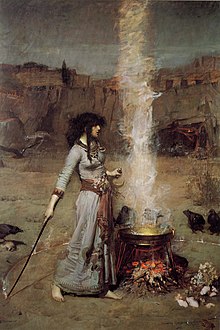Witch (word)

The word witch derives from the Old English nouns ƿiċċa [ˈwittʃɑ] ('sorcerer, male witch, warlock') and ƿiċċe [ˈwittʃe] ('sorceress, female witch'). The word's further origins in Proto-Germanic and Proto-Indo-European are unclear.
History[]
Throughout history there has not been a consistent definition of the term witch. Johannes Nider and other 15th century writers used the Latin term maleficus to mean witch—a person who performed maleficium, harmful acts of sorcery, against others. The witch hunts of medieval Europe differed from pre-Christian practices in condemning the witch as a moral corruption, rather than focusing on whether the act of sorcery was harmful, expanding the customary understanding of the maleficium concept. The introduction of the idea of demonic forces empowering the acts of maleficium gave the term witch new connotations of idolatry and apostasy that were adopted by Malleus maleficarum, but these remained disputed despite papal injunctions to take action against witches.[1]
Germanic etymology[]
The Old English verb wiccian has a cognate in Middle Low German wicken (attested from the 13th century, besides wichelen 'to bewitch'). The further etymology of this word is problematic. It has no clear cognates in Germanic outside of English and Low German, and there are numerous possibilities for the Indo-European root from which it may have been derived.
- The OED states that the noun is "apparently" deverbal (derived from wiccian), but for the verb merely states that it is "of obscure origin".
- Grimm, Deutsches Wörterbuch connects the "Ingvaeonic word" *wikkōn with Gothic WIKI
